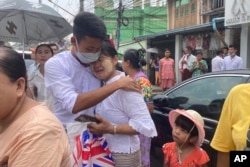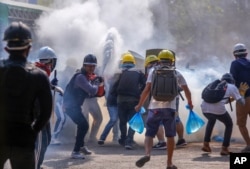A handful of the more than 2,000 political prisoners recently freed by Myanmar’s post-coup junta have told VOA they remain under military surveillance and are afraid of being rearrested.
The junta released 2,153 prisoners May 3, who had been sentenced under Section 505 (A) of the Penal Code, which criminalizes “causing fear, spreading false news, or agitating directly or indirectly criminal offences against government employee."
The prisoners were released on the condition that each "serve the new punishment in addition to the remaining punishment to which he was sentenced this time if further offenses are committed."
VOA contacted a dozen released prisoners for this article, but many refused to talk out of security concerns. The released prisoners had to sign a document pledging not to commit any acts of violence against the country.
"I hesitated to sign the document, but I did so in order to be released from an inhumane prison." said a 27-year-old released prisoner using the pseudonym “Hay Mar,” who was released from Tharyarwaddy prison in Bago region.
"If you wrote about why I was arrested in your article, it would be easy to find me and arrest me again. The junta is keeping an eye on me. Because of this, I don't talk to any of my friends and only go outside when I have to," she added.
Another ex-political prisoner, Shwe Zin, a 26-year-old university student, said she feels in danger. She said she noticed some men watching her when she met with some friends at a restaurant after her release.
“When I moved to another restaurant, they followed by the car. I’m afraid of talking to media. However, I want other people to know what’s happening in prisons and interrogation camps,” she said.
When she participated in a June 2021 protest against the coup, she was trapped by the junta in Yangon, which used a friend of hers as a lure.
“My friend asked to meet. I didn’t know he had been arrested. When I arrived at the meeting place, I was arrested,” Shwe Zin told VOA.
She was then blindfolded and taken to a building and was kicked constantly by three men. They bruised her hip so painfully she could not sit for days. She was then sent to the military interrogation center in Yangon’s Mingalardon township.
“They did not provide food or water for four days. Later, they asked me for the contact information of other dissidents. When I refused, they started beating me,” Shwe Zin said.
She was then blindfolded again and forced to kneel and was beaten with a baton for about three weeks.
“One day when it rained, I was told to sit in the mud and was beaten. When I lost consciousness, a man threw water on my face to wake me up. Some soldiers were drunk,” she added.
She hit her head against the wall when the pain became too much to bear.
"When I became too aggressive, they chained me to a chair. They did not, however, cease asking the same questions and continued to beat me at night,” Shwe Zin said.
She was sent to Yangon’s Insein prison and, in March 2022, given three years’ imprisonment under Section 505(A).
“Because of being tortured, I still have a serious migraine,” she added.
Freed prisoners said females arrested for having ties to the revolution were often subjected to psychological and physical harm during interrogation.
"They don’t hesitate to do anything to get the information they wanted. They threatened us: ‘we can rape you.’ It was very devastating,” Hay Mar, arrested in January 2022 in Yangon, said. Dissidents were tortured in various ways to force them to disclose activities of their comrades. Finally, they were forced to sign blank papers and were charged under articles providing for long term imprisonment, freed prisoners said.
Among those released in May, Aung Tun, one of the leaders of the flash-mob protest, was also subjected to torture and interrogation.
He was arrested while protesting in Yangon in April 2021. He was held in two interrogation camps and survived various tortures — he said he was beaten with a baton while being interrogated about his group’s activities and the locations of his comrades, and had a gun put in his mouth, In addition, he said a group of soldiers urinated on him and threatened to kill him. In addition, he said, they cut off his food and water for days, and he was kept awake all night with electric shocks and forced to clean toilets.
"Nearly 100 people were detained in a room at the interrogation center in Shwepyithar Township. There was no restroom available; only a toilet was provided. We were required to take a shower and clean our faces with toilet water. We didn't have enough drinkable water, and we just had a handful of rice,"Aung Tun said.
After being captured and tortured by the army for interrogation, dissidents had to survive various hardships in prisons. A lot of prisoners are locked in a small cell block. Besides being tortured by prison authorities and criminal prisoners, prisoners live with unhealthy food and poor health services. According to freed prisoners, they were beaten and shot at by the prison authorities when they complained, so many prisoners suffer from severe mental problems.
"Three death row women in the Thayarwaddy prison told me they wanted to commit suicide as they were so devastated by the prison conditions," said Hay Mar.
Prisoners who were released said they were locked up in prison without seeing their families until they were released.
While the former prisoners said they did not regret their political activities or their arrests, they said they plan to leave military-controlled areas because of fear of rearrest..
“Since I do not feel secure in the country, I plan to leave. I will speak openly about the atrocities committed by the army once I am in a safe place to do so,” said Hay Mar.
“Our comrades are still behind the bars and living in darkness. I don't know when these people will be free. We need to speak out about these people. I made promises to my comrades. I still have many duties to keep my promises,” said Aung Tun, who plans to join the anti-junta forces.








